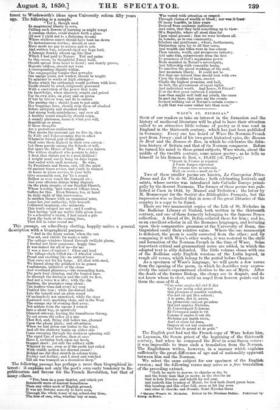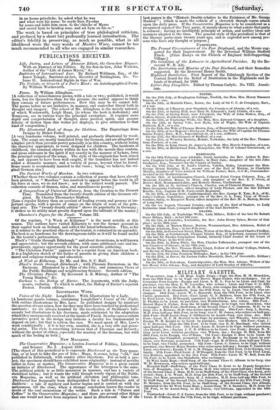WACE'S ST. NICHOLAS. * SUCH of our readers as take an
interest in the formation. and the history of mediteval literature will be glad to have their attention called to an attractive little volume of poetry as it -was read in England in. the thirteenth century, which has just been published in Germany. Every one has heard of Wace the Norman-French poet from Jersey; and of his two great historical epics, the Boman de Brut and the Boman de Ron, in which he celebrates the faint, lone history of Britain and that of its Norman conqueror. Before he turned his mind to these grand eubjeots, Wace wrote, about the middle of the twelfth century, some minor poetry ; as he tells ua himself in his Roman de Ron, v. 10,1,52 (ed. Pluquet) : " Quant de France jo repairai A Caem lunges eonverssi De romans fere m'entremis Mult en escris e mult en fis."
Two of these smaller poems are known, La Concepcion Miro- Dame and Lis Vie de. SL Aricholas ; both celebrating festivals and saints, whose-service was introduced into Catholic Europe princi- pally by the devout-Normans, The former of those poems was pub.- lashed at Caen in 1842, by- Mancel and Trebutien ; the latter by M. Menmerque for the Societe des Bibliophiles Francais, but the impression was so limited that in none of the great libraries of this country is a copy to be found.
There are two manuscript copies, of the Life of St. Nicholas itt the Bodleian Library, at Oxford, both written in the thirteenth; century, and one of them formerly belonging to the famous -Douce collection. A friend of Dr. Denim collated these for him ; and lie, as an excellent scholar in all the Romance languages, and lecturing, upon their comparative at the University of Boni4 dia tinguished easily their relative value. Where the one manuscript is deficient, the poem- is easily corrected from the other; and. by comparing it with Wace's other works, it was restored to the style and formation of the Norman-French in the time of Wae.e. Some. important critical and. grammatical notes are added, in which tlw adopted text is ably defended. The little volume closes with one of the Bodleian early English versions of the. Latin legend, in' rough old verses, which belong to the period before Chaucer.
As a specimen of Wace's language, we will quote a few verses from the opening of the poem, in which he describes very expres- sively the saint's supernatural election to the see of Myra. A_fter the death of the former Bishop, the clergy-are in despair, and do not know whom to elect, until an angel front heaven points out to them- the man of Gad.
"Uns seinz angles del ciel li dist
Qu'il par matin celui Feist Qui premiers al mustier vendroit, Ceo iert cil qui_Dex esliroit ; A le porte, diet il, serras,
Le .prememin entrant prendras Qui iert appoloz Nicholas,
Et Tercevesquie li &aims. Et l'evesques issint le vit Comma li angles li out dit. Nicholaa par matin trova,. Anal et croce lui dons, Onques ni out nul conterdit Qui fust de grand at de petit."
The English poet had-not -the French -copy of Wace before like, as Layamon the Saxon priest of the beginning of the thirteenth century, had when he composed the Brut in semi-Saxon verses : it was impossible to trace such a translation from the Norman. The Englishman -writes, however, in a manner which explain& sufficiently the great difference of age and: of nationality apparent between him and the Norman.
We select the same subject for-our specimen of the Engliela version; and the following verses may serve as a free translation of the preceding extract.
"Goth he aeyde to morwe. to chirche ar day be and the ferate man that.ye mowe. in the eherche jai) that is hate Neoolas.. and taketh by wel sane and maketh him byashep of Myrre. for God bath ihurd yours bone this bysshop and. this other folk, arose ar hit day were and come te cherche and ifounde. Seint Nyeolas.there ••Maistre Wace's St. Nicholas. Edited brEt. Nicola= Dallas. Published bp Etinis,a‘Bboni. in an herne priveliche. hy asked what he was and what were his name, he seyde Syre Nycolas hy nome and ladde him anon, to the chirche of Myrre and sacred hym to byashop sone. and set hym on his se."
The work, is based on principles of true philological criticism, and prefaced by a short but profoundly learned introduction. The editor's fidelity in preserving, as much as possible, what in all likelihood were the very words of Maistre Witee, cannot be too much recommended to all who are engaged in similar researches.



























 Previous page
Previous page